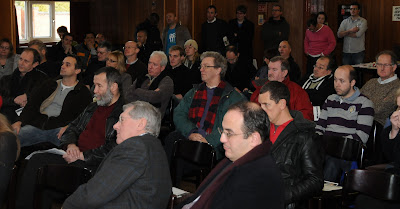Friday, 31 December 2010
United we must stand - Mark Serwotka in the Guardian
We cannot have a pick 'n' mix approach to opposition to the cuts – our future is at stake
http://www.guardian.co.uk/commentisfree/2010/dec/30/unions-cuts-protest
http://www.guardian.co.uk/commentisfree/2010/dec/30/unions-cuts-protest
Wednesday, 22 December 2010
Wednesday, 8 December 2010
First Public Meeting A Success

Approximately 100 people braved the cold on Saturday 4th December to attend the first public meeting of the Northampton Against the Cuts and Privatisation campaign. A cross section of people who live and work in Northampton came along to discuss their opposition to the cuts and how to campaign against them.
Emily Dean, president of the Students Union at the University of Northampton, spoke out against the planned changes to higher education, with the increase in tuition fees a major concern.
Billy Hayes, General Secretary of the CWU, said how pleased he was to see so many people at the meeting and this reflected the strength of feeling in Northampton. Mr Hayes said that not only should we be opposing the cuts, but we should be campaigning for more investment in the public sector.
Sally Ruane, deputy director of the health research unit at De Montford University, spoke very eloquently as she attacked the government's arguments for the cuts. She argued that by collecting the tax which is owed, the deficit could be eliminated with destroying jobs and services. She went on to put the deficit into historical context and to point out that the the UK had a far larger deficit after World War II, but was still able to build the Welfare State.
Monday, 22 November 2010
Tuesday, 16 November 2010
Northampton Anti Cuts Meeting 4th December
The first public meeting of Northampton Against the Cuts will take place on Saturday 4th December. The St James Working Men's Club is the likely venue, but this will be confirmed nearer the time.
The meeting will be a fantastic opportunity for local people, voluntary
groups, charities, trade unions and other campaigning organisations to
come together to discuss the proposed cuts and how best to respond to them.
We are fortunate enough to have two prominent speakers who will add a national perspective to the discussion.
Dr John Lister will be discussing the dangers posed to the NHS and Billy Hayes, General Secretary of the Communication Workers Union will talk about the threat to the Royal Mail.
There will also be speakers from local community groups and charities who can tell us more about the impact of the cuts.
The meeting will be a fantastic opportunity for local people, voluntary
groups, charities, trade unions and other campaigning organisations to
come together to discuss the proposed cuts and how best to respond to them.
We are fortunate enough to have two prominent speakers who will add a national perspective to the discussion.
Dr John Lister will be discussing the dangers posed to the NHS and Billy Hayes, General Secretary of the Communication Workers Union will talk about the threat to the Royal Mail.
There will also be speakers from local community groups and charities who can tell us more about the impact of the cuts.
Tax cheats cost the country more than £120 billion a year
Tax justice
Addressing the ‘tax gap’ is a vital part of tackling the deficit. Figures produced for PCS by the Tax Justice Network show that £25 billion is lost annually in tax avoidance and a further £70 billion in tax evasion by large companies and wealthy individuals.An additional £26 billion is going uncollected. Therefore PCS estimates the total annual tax gap at over £120 billion (more than three-quarters of the annual deficit!). It is not just PCS calculating this; leaked Treasury documents in 2006 estimated the tax gap at between £97 and £150 billion.
If we compare the PCS estimate of the tax gap with the DWP estimate of benefit fraud, we can see that benefit fraud is less than 1% of the total lost in the tax gap (see diagram opposite).
Employing more staff at HM Revenue & Customs would enable more tax to be collected, more investigations to take place and evasion reduced. Compliance officers in HMRC bring in over £658,000 in revenue per employee.
If the modest Robin Hood tax – a 0.05% tax on global financial transactions – was applied to UK financial institutions it would raise an estimated £20–30bn per year. This alone would reduce the annual deficit by between 12.5% and 20%.
Closing the tax gap, as part of overall economic strategy, would negate the need for devastating cuts – before even considering tax rises.
Our personal tax system is currently highly regressive. The poorest fifth of the population pay 39.9% of their income in tax, while the wealthiest fifth pays only 35.1%. We need tax justice in personal taxation – which would mean higher income tax rates for the richest and cutting regressive taxes like VAT and council tax.
Fair Deal?
The UK's deficit is as a result of the unprecedented bail out of the banks, not because of the teachers, nurses, students, civil servants, the poor or the disabled. The banks are still paying out billions in bonuses but it is the rest of us who are expected to pick up the tab for their recklessness.
And George Osborne calls this a fair deal.
Subscribe to:
Comments (Atom)







